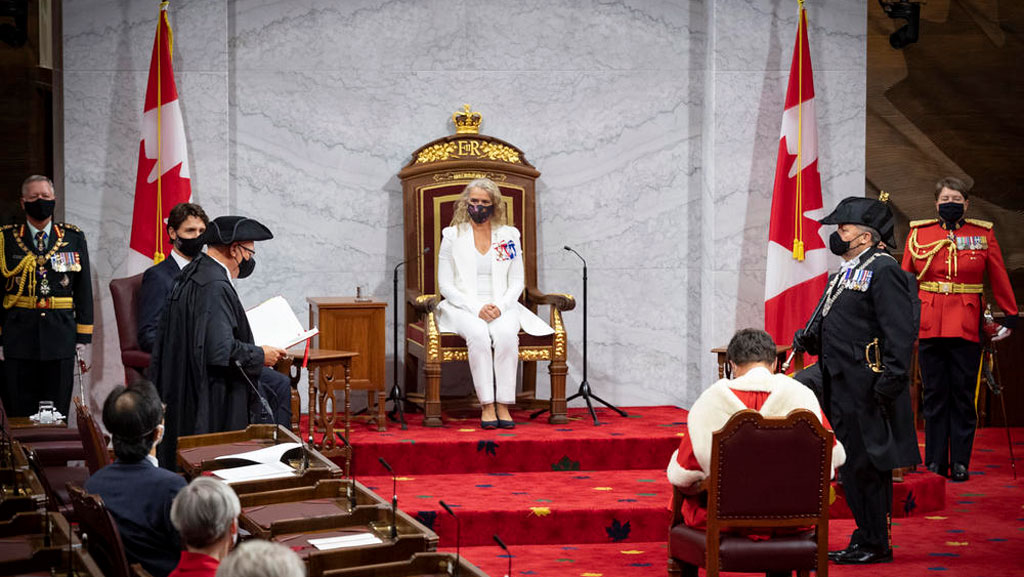The Justin Trudeau government intends to create thousands of jobs by supporting retrofits of homes and buildings and investing in reducing the impact of climate-related disasters, like floods and wildfires, as part of a modest green agenda announced in the speech from the throne Sept. 23.
Indicating a plan to build “a more resilient Canada,” the government will “help deliver more transit and active transit options,” the speech stated.
Canada’s 150th speech from the throne was read in the Senate Chamber by Gov. Gen. Julie Payette with the prime minister at her side. There was no direct mention of significant stimulus infrastructure spending.
The government will immediately bring forward a plan to exceed Canada’s 2030 climate goal, the speech indicated, and the government will also legislate Canada’s goal of net-zero emissions by 2050.
Communities will be supported through investments in “all types of infrastructure, including public transit, energy efficient retrofits, clean energy, rural broadband, and affordable housing, particularly for Indigenous peoples and northern communities.”
To help the economy recover from the COVID-19 pandemic, the Liberals pledged to launch a campaign to create over one million jobs, restoring employment to previous levels. A range of tools will be employed, including direct investments in the social sector and infrastructure, immediate training to “quickly skill up workers,” and incentives for employers to hire and retain workers.
Businesses will also be assisted with an extension of the Canada Emergency Wage Subsidy through to next summer.
“The government will work with businesses and labour to ensure the program meets the needs of the health and economic situation as it evolves,” Payette said.
The government also announced an acceleration of the Universal Broadband Fund and said it would be making “substantial investments” in housing.
Payette stated the government will supplement its National Housing Strategy by increasing investments to rapid housing in the short term and partnering with not-for-profits and co-ops in the mid- to long-term. The government will also move forward with enhancements to the First-Time Home Buyer Incentive.
“Construction projects create jobs, and having a home is critical so people can contribute to their communities,” Payette said.
The government also announced a transition of the Canada Emergency Response Benefit program to the Employment Insurance (EI) system.
For people who would not traditionally qualify for EI, the government will create the transitional Canada Recovery Benefit. Over the coming months, the EI system will become the sole delivery mechanism for employment benefits, including for Canadians who did not qualify for EI before the pandemic.
Business supports announced, in addition to extending the wage subsidy, include expanding the Canada Emergency Business Account to help businesses with fixed costs, improving the Business Credit Availability Program, and introducing further support for industries that have been the hardest hit, including travel and tourism, hospitality and cultural industries.
Early reaction included statements from the Mechanical Contractors Association of Canada (MCAC), the Residential and Civil Construction Alliance of Ontario (RCCAO) and Canada’s Building Trades Unions (CBTU).
“With today’s throne speech, we are optimistic that the federal government has laid the groundwork to work closely with industry in the rebuilding of the Canadian economy,” said Dave Holek, MCAC president. “We are actively reviewing the details from today’s speech, and are working diligently on an action plan to partner on strategic initiatives that will benefit all Canadians.”
The RCCAO statement said it was positive that infrastructure and housing were highlighted in the speech. But executive director Andy Manahan added he hopes that fast-track funding of infrastructure would be announced soon to advance shovel-ready projects, particularly as many municipalities are facing severe revenue shortfalls.
“Putting our residential and civil contractors to work on both state-of-good-repair and new infrastructure projects would create much-needed jobs, kick-start our ravaged economy and build a more resilient future,” said Manahan.
Sean Strickland, CBTU executive director, commented, “Canada’s Building Trades Unions applaud the government for a balanced approach to address the immediate issues around the COVID-19 pandemic, while planning for an economic recovery that levels the playing field for all Canadians. Investing in infrastructure and shovel-ready projects will create immediate job opportunities and address Canada’s infrastructure needs.”
The speech was delivered 39 days after Trudeau prorogued parliament.
The Canadian Construction Association also issued a statement indicating it was “pleased to hear commitments by the federal government to invest in infrastructure and skilled training, secure jobs and support small and medium-sized businesses.
“The extension of the Canada Emergency Wage Subsidy until next summer and the expansion of liquidity supports such as the Canada Emergency Business Account and the Business Credit Availability Program will help small and medium-sized businesses in Canada’s construction sector contribute to employment, job creation and economic growth. Additional measures, including reskilling displaced workers and supporting education and accreditation, were also welcome announcements.”
Follow the author on Twitter @DonWall_DCN.











Recent Comments